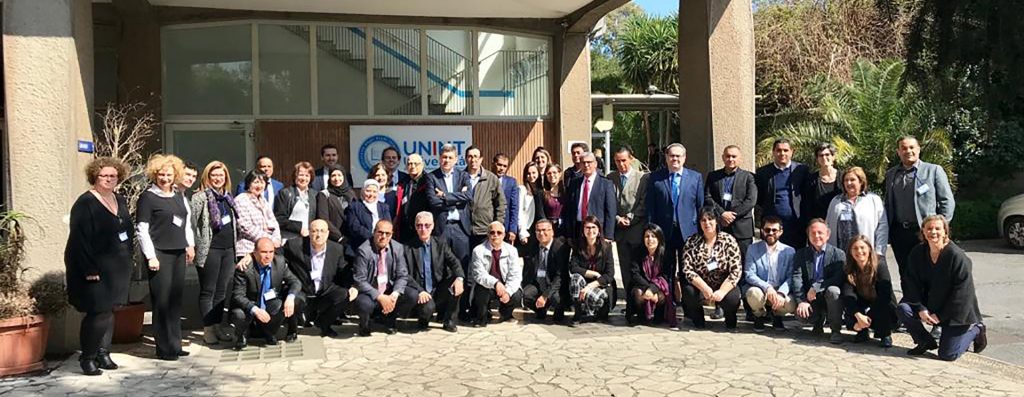Project Acronym
Programme
Partners
-
Commission d'Implémentation d'un système d'Assurance Qualité dans les établissements d'Enseignement Supérieur – CIAQES
-
Ministère de l’Enseignement Supérieur et de la Recherche Scientifique– MESRS
-
Université de El Oued
-
Université Kasdi Merbah Ouargla
-
Université 20 août 1955-Skikda
-
Université Abderrahmane Mira de Bejaia
-
Ecole polytechnique d'architecture et d'urbanisme, EPAU
-
Université des Sciences et de la Technologie d'Oran Mohamed-Boudiaf USTOMB
-
Université Djillali Liabès de Sidi Bel-Abbès
-
Université d’Alger 2 Abou El Kacem Saâd Allah
-
Université d’Alger 1, Benyoucef Benkhedda
-
Université Mouloud Mammeri de Tizi Ouzou
-
Université Ferhat Abbas Sétif 1
-
Université Mohamed Lamine Debaghine, Sétif 2
-
Université Paris 1 Panthéon Sorbonne
-
Université de Rouen Normandie
-
Université de Pavia
-
Université Ca’ Foscari Venise
-
UNIMED, Mediterranean Universities Union
(Coordinator)
Budget
Project Duration
Project No

ESAGOV’s context:
Marked for a long time by a very strong centralization, the higher education system in Algeria has gradually begun to adapt to new requirements, particularly in terms of quality assurance, and to establish a framework conducive to a greater accountability of universities.
As early as 2008, during the Higher Education Conferences, the Ministry of Higher Education and Scientific Research (MESRS) took a series of measures making the modernization of higher education in Algeria a priority. Indeed, it appeared that in order to best accomplish its pedagogical and scientific missions, the universities had to adapt their organization and functioning. The two main pillars on which modernization should be based and which were highlighted during the conference are governance and evaluation. For the latter, the implementation of a quality assurance system proved necessary. Thus, the following were created: i) the National Commission for the Implementation of Quality in Algerian Higher Education (CIAQES); ii) the National Commission for Evaluation; iii) quality cells in all higher education institutions.
Thus, evaluation and governance have been placed at the heart of the priorities of the Ministry of Higher Education and Scientific Research and at the heart of the Algerian-European program of modernization of higher education PAPS-ESRS (support program to the sectoral policy)
The definition of these institutional projects was posted as a priority by the MESRS, which had developed a Canevas for the development of an institutional project (MESRS, General Inspection of Pedagogy, 2017).
For 4 years, ESAGOV was therefore part of this reform and strengthened the quality approach in Algerian universities and accompanied them in the process of revising their institutional project, through operational support, rigorous, inspired by good European practices and based on the participatory approach.
The specific objectives of the ESAGOV project were the following:
- Strengthening the role of universities in defining their own missions, which is essential for pursuing the process of empowerment through the definition of an institutional project specific to each university, resulting from a process of consultation between all the actors of university life and reflecting its particularities, specializations and areas of excellence;
- The strengthening of the strategic skills of the university’s managers and academic and administrative staff;
- A strengthening of the evaluation system and the quality approach within the institutions, notably by bringing together the quality assurance and pedagogical training units.